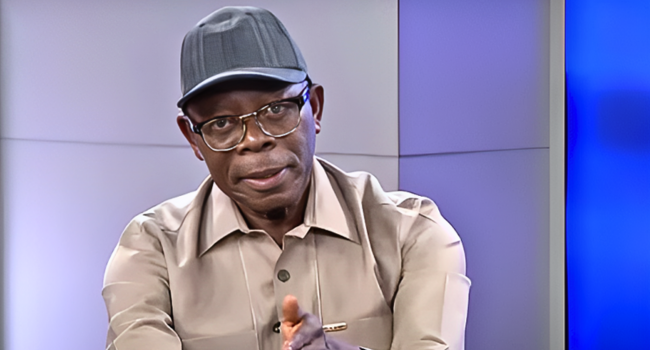Senator Adams Oshiomhole has accused the Central Bank of Nigeria (CBN), under the administration of former President Muhammadu Buhari, of precipitating the collapse of the naira through what he described as “reckless and excessive” printing of money—an act he likened to the fiscal mismanagement that once plagued Zimbabwe and Idi Amin’s Uganda.
Speaking on Saturday during an interactive session organised by the Progressives Governors Forum in Benin City, the former Edo State governor laid the blame for Nigeria’s ongoing currency and inflation crises squarely on the CBN’s use of the Ways and Means provision, a legal mechanism that allows the Federal Government to borrow from the central bank in times of temporary fiscal shortfalls.
Oshiomhole, who currently represents Edo North in the Senate, alleged that over ₦31 trillion was printed under the guise of Ways and Means advances. He criticised the use of such economic jargon to mask what he characterised as unsustainable monetary expansion without real economic backing.
“We are coming from a country that was almost like Zimbabwe or Idi Amin’s Uganda,” Oshiomhole said, drawing a stark comparison. “Where Idi Amin asked his central bank governor to ‘go and print more money for us to share’. And the man warned him that the currency would become worthless paper.”
He continued: “That is what the immediate past Central Bank governor did. They printed over ₦31 trillion under what they called Ways and Means. But let’s not be deceived by the name. It means printing money not backed by productivity, not by exports or oil revenues, but simply for distribution to satisfy a political illusion of wealth.”
Oshiomhole warned that the consequences of this fiscal policy are evident in the sharp depreciation of the naira and the soaring cost of living experienced nationwide. “To understand the root cause of our present economic pains—high inflation, weak currency, high cost of living—you must trace it to the reckless creation of money through Ways and Means,” he stated.
The senator lauded President Bola Tinubu’s administration for halting the practice, which he said had mortgaged the country’s financial future. He noted that the current government was now saddled with the challenge of repaying the ballooning debts incurred under the previous administration.
“We were borrowing every day the way fish drink water,” Oshiomhole remarked pointedly. “Now, it has become President Tinubu’s burden to repay those loans and defend the sovereignty of this nation.”
In response to growing concerns over monetary policy and public accountability, the Senate in 2024 constituted an ad-hoc committee to investigate the operations of the Ways and Means facility, as well as the Anchor Borrowers Programme—another initiative of the former CBN leadership that has come under scrutiny for lack of transparency and effectiveness.
Oshiomhole’s comments are likely to intensify ongoing debates about the CBN’s independence, fiscal responsibility, and the need for reforms in Nigeria’s monetary policy framework. Analysts warn that while halting the use of Ways and Means may restore some confidence in economic management, the effects of past excesses could take years to unwind.
